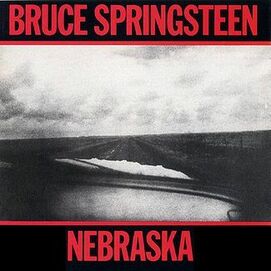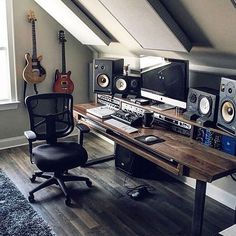"Everyone wants to make music. Now, with bedroom recording, almost anyone can." -- Miles De Rosa

Everyone wants to make music. Now, with bedroom recording (making music in a home studio with less-than-sophisticated equipment), almost anyone can. This has long been a factor in music, but over the last few years it has begun to change the industry entirely.
The advent of drum machines and synthesizers, as well as the cassette tape, drove this boom for a while in the eighties. The tape made recording easy, and drum machines and synths made it physically easier make music. You didn’t need to be a drumming master to make a beat with an 808 and you didn’t need to understand music theory to make a complex melody with a synthesizer. Even superstars of the time made some of their most famous projects in this style. Bruce Springsteen’s Nebraska (left), an intimate and highly political acoustic album recorded in the wake of Reagan’s first election, was recorded on a cassette tape. The guitar and vocals of Tom Petty’s American Girl were recorded in his garage. Even the Rolling Stones, with Exile on Mainstreet, got into the action.
Making music in a small home studio or even just in a bedroom isn’t new, but accessibility to it is. Musicians now have more outlets then ever before to get their exposure for their music. Soundcloud, Spotify, Bandcamp and many other sites allow independent musicians to upload to their platforms.
It’s led to a slew of music. A beautiful, unorganized, unproffessional explosion of amatuer artistry. Few have found major success. Chance The Rapper repeatedly references his artistic independence in his songs and interviews. His self-founded fame provides a road map to other artists. His first mixtape, 10 Day, was recorded at the Chicago Public Library. He uploaded it to soundcloud and it has since been streamed hundreds of thousands of times. Though Chance has been approached many times by big-name labels, he has never signed.
Most stories don’t end up like Chance The Rapper’s. His bedroom recording (well. library recording) led to fame, plays, and people picking his music in an era where we have more than ever to pick from. There are an estimated 20 million songs just on Spotify. Soundcloud has 125 million songs, 110 of which are user uploaded, most which aren’t on Spotify. Tidal has an estimated 30 million ‘paid songs’ (songs that you need to pay the service to listen to) so it would be fair to assume that 10 million of those aren’t on Spotify. So between Spotify, Tidal, and Soundcloud, there's 140 million songs out there.
According to Spotify, 4 million of their 20 million songs have gone unplayed. 20% of their songs. So to extrapolate, there is 140 million songs between these three streaming sites. If 20% goes unplayed, 28 million of these songs have gone unplayed. Assuming every song is an average of three minutes, it would take just under 160 years of straight listening to have heard just the songs that have never been played before. It would take 799 to listen to all of them.
Bedroom recording isn’t new, but an artist's ability to push their music out is. The combination of the ease of bedroom recording and the accessibility results in a scrum of music provided to listeners, leading us to a world devoid of the rockstar. Their is simply so much music out there that it’s near impossible to rise above it for any meaningful period of time. Last year belonged to Travis Scott, Cardi B, J. Cole, and The Carters. 2017, to Kendrick Lamar and Bruno Mars.
Musicians and bands that were on top used to rule for decades. Now you’re lucky if your turn on top lasts a year. It’s becoming key to stay relevant, and to do so, there’s a need to keep releasing music. J. Cole recently posted a playlist on his Spotify titled “Where The Fuck Is The Offseason’ made up of mostly songs featuring him, plus a few singles. Continuing to release singles and be a featured artist has become key to staying in the conversation.
This rise of bedroom recording along with the rise of social media has also led to incredible amounts of self promotion. Chance The Rapper often talks about passing out music on the streets of Chicago. Soundcloud rappers and shameless plugs have taken over instagram and snapchat. With the ability to upload music without the help of a label and the self-promotion and networking capabilities of social media, the label is becoming obsolete.
The biggest labels of the day are started by other artists. Dreamville was started by J. Cole and is locked in a arms race of talent with Kendrick Lamar’s label Top Dawg Entertainment (TDE). Jay-Z’s label, Roc-A-Fella Records, is where Cole got his start. Artists starting their own label is nothing new, but it wasn’t entirely common either. At least, not as common as it has become.
Most up and coming artists are now signing with one of these artist-started labels, or remaining completely independent. Like Chance, Noname, a fellow Chicago rapper, also remains independent. According to Wendy Day, “Independent artists can do everything a major label can.”
Though the advantages of being signed with one of the big labels - Atlantic, Colombia, Universal - are still there (scale, high-profile agents and producers, sophisticated recording equipment), it is becoming easier and easier to make it as an independent artist. The rise of bedroom recording coupled with the current ease of self promotion might lead to the death of corporate labels all together. That being said, it may also lead to the death of the rockstar. As more and more people start catching on, it will get harder and harder to rise above the crowd.
The advent of drum machines and synthesizers, as well as the cassette tape, drove this boom for a while in the eighties. The tape made recording easy, and drum machines and synths made it physically easier make music. You didn’t need to be a drumming master to make a beat with an 808 and you didn’t need to understand music theory to make a complex melody with a synthesizer. Even superstars of the time made some of their most famous projects in this style. Bruce Springsteen’s Nebraska (left), an intimate and highly political acoustic album recorded in the wake of Reagan’s first election, was recorded on a cassette tape. The guitar and vocals of Tom Petty’s American Girl were recorded in his garage. Even the Rolling Stones, with Exile on Mainstreet, got into the action.
Making music in a small home studio or even just in a bedroom isn’t new, but accessibility to it is. Musicians now have more outlets then ever before to get their exposure for their music. Soundcloud, Spotify, Bandcamp and many other sites allow independent musicians to upload to their platforms.
It’s led to a slew of music. A beautiful, unorganized, unproffessional explosion of amatuer artistry. Few have found major success. Chance The Rapper repeatedly references his artistic independence in his songs and interviews. His self-founded fame provides a road map to other artists. His first mixtape, 10 Day, was recorded at the Chicago Public Library. He uploaded it to soundcloud and it has since been streamed hundreds of thousands of times. Though Chance has been approached many times by big-name labels, he has never signed.
Most stories don’t end up like Chance The Rapper’s. His bedroom recording (well. library recording) led to fame, plays, and people picking his music in an era where we have more than ever to pick from. There are an estimated 20 million songs just on Spotify. Soundcloud has 125 million songs, 110 of which are user uploaded, most which aren’t on Spotify. Tidal has an estimated 30 million ‘paid songs’ (songs that you need to pay the service to listen to) so it would be fair to assume that 10 million of those aren’t on Spotify. So between Spotify, Tidal, and Soundcloud, there's 140 million songs out there.
According to Spotify, 4 million of their 20 million songs have gone unplayed. 20% of their songs. So to extrapolate, there is 140 million songs between these three streaming sites. If 20% goes unplayed, 28 million of these songs have gone unplayed. Assuming every song is an average of three minutes, it would take just under 160 years of straight listening to have heard just the songs that have never been played before. It would take 799 to listen to all of them.
Bedroom recording isn’t new, but an artist's ability to push their music out is. The combination of the ease of bedroom recording and the accessibility results in a scrum of music provided to listeners, leading us to a world devoid of the rockstar. Their is simply so much music out there that it’s near impossible to rise above it for any meaningful period of time. Last year belonged to Travis Scott, Cardi B, J. Cole, and The Carters. 2017, to Kendrick Lamar and Bruno Mars.
Musicians and bands that were on top used to rule for decades. Now you’re lucky if your turn on top lasts a year. It’s becoming key to stay relevant, and to do so, there’s a need to keep releasing music. J. Cole recently posted a playlist on his Spotify titled “Where The Fuck Is The Offseason’ made up of mostly songs featuring him, plus a few singles. Continuing to release singles and be a featured artist has become key to staying in the conversation.
This rise of bedroom recording along with the rise of social media has also led to incredible amounts of self promotion. Chance The Rapper often talks about passing out music on the streets of Chicago. Soundcloud rappers and shameless plugs have taken over instagram and snapchat. With the ability to upload music without the help of a label and the self-promotion and networking capabilities of social media, the label is becoming obsolete.
The biggest labels of the day are started by other artists. Dreamville was started by J. Cole and is locked in a arms race of talent with Kendrick Lamar’s label Top Dawg Entertainment (TDE). Jay-Z’s label, Roc-A-Fella Records, is where Cole got his start. Artists starting their own label is nothing new, but it wasn’t entirely common either. At least, not as common as it has become.
Most up and coming artists are now signing with one of these artist-started labels, or remaining completely independent. Like Chance, Noname, a fellow Chicago rapper, also remains independent. According to Wendy Day, “Independent artists can do everything a major label can.”
Though the advantages of being signed with one of the big labels - Atlantic, Colombia, Universal - are still there (scale, high-profile agents and producers, sophisticated recording equipment), it is becoming easier and easier to make it as an independent artist. The rise of bedroom recording coupled with the current ease of self promotion might lead to the death of corporate labels all together. That being said, it may also lead to the death of the rockstar. As more and more people start catching on, it will get harder and harder to rise above the crowd.


